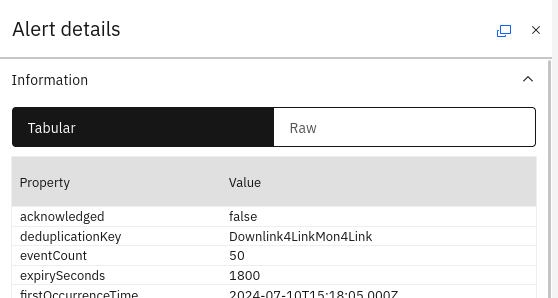5. Create an event housekeeping automation
5.1: Overview
In this Lab, you will create an event housekeeping automation that will set the expirySeconds attribute for every event. When this attribute is set, an internal AIOps automation will automatically clear any events whose last occurrence is more than expirySeconds ago. Note that this is equivalent to setting the @ExpireTime field in Netcool/OMNIbus, which is then acted on by the expire trigger. Indeed, if you map the @ExpireTime field to the expirySeconds attribute in AIOps, it will achieve the same result. It is important to have a default event expiry automation in-place in AIOps in any case however, since not all events in AIOps originate in Netcool, and hence there needs to be some sort of régime in-place to cater to these events too.
5.2 Create a Netcool/Impact policy
In this section, you will create a JavaScript policy in Netcool/Impact that will be used to set the expirySeconds attribute in events, depending on the criteria that are define. In our case, we will create a policy that sets expirySeconds based on the severity of the event. Use the following steps to create the new housekeeping policy in Netcool/Impact:
- Navigate to the Netcool/Impact GUI:
https://netcoolvm:16311/ibm/console - Log in to Netcool/Impact as the user
impactadminand passwordnetcool - Click on the Policies tab
- Click on the pull-down menu button on the new policy button and select JavaScript Policy
- Copy and paste the following sample policy into the policy editor:
Load('AIOPS_Utils');
// ONLY SET expirySeconds FOR EVENTS WHERE IT IS NOT SET
if (String(EventContainer.alert.expirySeconds) == "undefined" || String(EventContainer.alert.expirySeconds) == "0") {
// KEEP CRITICAL ALERTS FOR SEVEN DAYS
if (Int(EventContainer.alert.severity) == 6) {
aiopsUtils.patchAlertNoWait(EventContainer.alert.id,{expirySeconds:604800});}
// KEEP MAJOR ALERTS FOR FIVE DAYS
else if (Int(EventContainer.alert.severity) == 5) {
aiopsUtils.patchAlertNoWait(EventContainer.alert.id,{expirySeconds:432000}); }
// KEEP MINOR ALERTS FOR THREE DAYS
else if (Int(EventContainer.alert.severity) == 4) {
aiopsUtils.patchAlertNoWait(EventContainer.alert.id,{expirySeconds:259200}); }
// KEEP WARNING ALERTS FOR ONE DAY
else if (Int(EventContainer.alert.severity) == 3) {
aiopsUtils.patchAlertNoWait(EventContainer.alert.id,{expirySeconds:86400}); }
// KEEP INFORMATIONAL EVENTS FOR TWELVE HOURS
else if (Int(EventContainer.alert.severity) == 2) {
aiopsUtils.patchAlertNoWait(EventContainer.alert.id,{expirySeconds:43200}); }
// KEEP INDETERMINATE EVENTS FOR SIX HOURS
else if (Int(EventContainer.alert.severity) == 1) {
aiopsUtils.patchAlertNoWait(EventContainer.alert.id,{expirySeconds:21600}); }
}
- Click on the Save button and save the policy as:
AIOPS_Housekeeping
5.3 Create a new AIOps policy
In this section, you will create an AIOps automation policy that will send events to the newly created Netcool/Impact policy.
Use the following steps to create the new AIOps automation policy:
- Log in to the AIOps console and select Automations from the main menu
- Click the Create policy button and choose Invoke IBM Tivoli Netcool/Impact to create a new policy
- Policy name: give your policy the name:
Housekeeping - Trigger entity: leave it set to
Alert - Trigger entity type: ensure After an alert is created is checked
- Trigger entity type: ensure After an alert has been updated is checked
- Set Alert property to Value of: alert.eventCount and Change to Changes
- Under Condition sets, click the Add condition button and choose Alert property
- Under Alert properties set Property to Value of: alert.eventCount, Operator to greater or equal, Matches to only, and Value to Number: 1
- Scroll down to the section: Then take the following actions:
- Under Impact connection, select your Netcool/Impact integration
- Under Impact policy, select your Netcool/Impact housekeeping policy:
AIOPS_Housekeeping - Under Impact policy parameter mapping options, select Send the full alert
- Scroll back up to the top of the page and click on the Create policy button
You can check that the policy is firing by checking the Last run timestamp in the Automations Policies view:

5.4: Clear the events in Netcool/OMNIbus
Reset the event set in your system by clearing out all the old events in the source: Netcool/OMNIbus.
Open a command terminal, connect to the ObjectServer VM via SSH (use netcool as password) and log in to the ObjectServer:
ssh netcool@netcoolvm
$OMNIHOME/bin/nco_sql -server AGG_P -user root -password netcool
Copy and paste the following SQL into the SQL prompt. Make sure to type Enter after go to execute the command:
delete from alerts.status;
go
5.5: View the Alerts viewer
The final confirmation step is to log in to AIOps and inspect the Alerts viewer.
- Log in to the AIOps console and select Alerts from the main menu
- FInd some alerts coming through from Netcool/OMNIbus
- Double-click one of the alerts and check that the
expirySecondsattribute is being set: